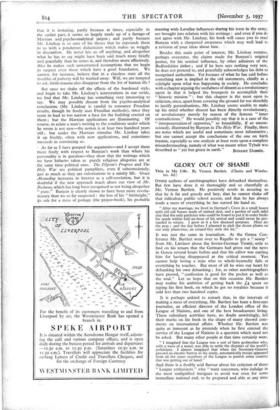GLORY OUT OF SHAME
OTHER authors of autobiographies have debunked themselves. But few have done it so thoroughly and so cheerfully as Mr. Vernon Bartlett. He positively revels in assuring us that he is fat and greedy and lazy, that he cannot shake off
that ridiculous public school accent, and that he has always made a mess of everything he has turned his hand to. -
" After my marriage, we lived in Gerrard's Cross in a small house with old oak beams made of stained deal, and a garden of such solid clay that the only gardener who could be found to put it in order broke his spade within half-an-hour of his arrival and could never be per- suaded to return. I grew in it a few diseased potatoes. Mice ate the peas ; and the day before I planned to pick the dozen plums on our only plum-tree, an errand-boy stole the lot."
It was just the same in journalism. At the Genoa Con- ference Mr. Bartlett went over to Rapallo to get a _".scoop " from Mr. Litvinov about the Soviet-German Treaty, only to find on his return that the Germans had given out the news in Genoa several hours before and that his editor was curling him for having disappeared at the critical moment. You cannot help loving a mart who so whole-heartedly fails at everything he touches. But most of all he wins our heart by debunking his own debunking ; for, as other autobiographers have proved, " confession is good for the pocket as well as the soul." Let us hope that on this occasion Mr. Bartlett may realise his ambition of getting back the £4 spent on
typing his first book, on which he got no royalties because it sold less than two hundred copies.
It is perhaps unkind to remark that, in the intervals of making a mess of everything, Mr. Bartlett has been a first-rate journalist, an efficient director of. the London office of the League of Nations, and one of the best broadcasters living. These subsidiary activities have, no doubt unwittingly, left their marks on his book in the shape of many shrewd com- ments on international affairs. Whether Mr. Bartlett was quite as innocent as he pretends when he first entered the service of the League of Nations is a question which need not be asked. But many other people at that time certainly were.
" I imagined that the League was a sort of fairy godmother who, with a wave of a wand, was able to settle the disputes of the world's politicians. I almost imagined that when the Secretary-General pressed an electric button in his study, automatically troops appeared from all the states members of the League to punish some country that was getting out of hand."
And there is a doubly acid flavour about his criticism of those " League enthusiasts " who " want statesmen, who indulge in the most undignified intrigues to avoid war even for some immediate national end, to be prepared and able at any time to drag their people into international war in defence of the Covenant, a document not one man in ten thousand has ever read." (By the way, this gibe at statesmen who try to avoid war seems a little inconsistent with another barbed remark about the folly of " a man who claims to be a patriot, but who talks about the glories of war ! ") Some of Mr. Bartlett's most illuminating experiences have been his interviews with dictators. Naturally, he has forgotten nearly everything they said to him. But he does record one revealing flash from Signor Mussolini in an interview shortly after the march on Rome : What would be his relations with England? I asked. They would have to be friendly, he replied, because England was strong.
Herr Hitler, after a few platitudes, began to shout : " It was almost as though, like Joan of Arc, he heard voices coming out of the air. I imagine that a man in a trance would behave in much the same way, and while he was shouting I am convinced that I could have walked out of the room and he would not have noticed my departure."
In another passage there is an apt contrast between the tech- nique of the two dictators, " The Duce controls the crowd, and tfie Fiihrer is the crowd."
One would like to quote more of the many good stories scattered up and down this attractive book. But the index refuses to help. Perhaps this is the part of the book which was written " in the train between Guildford and London." But even so, one could have done better in the time. Not half of the people mentioned in the book are listed in the
index, and not ten per cent. of the places. E. H. CARR.















































 Previous page
Previous page